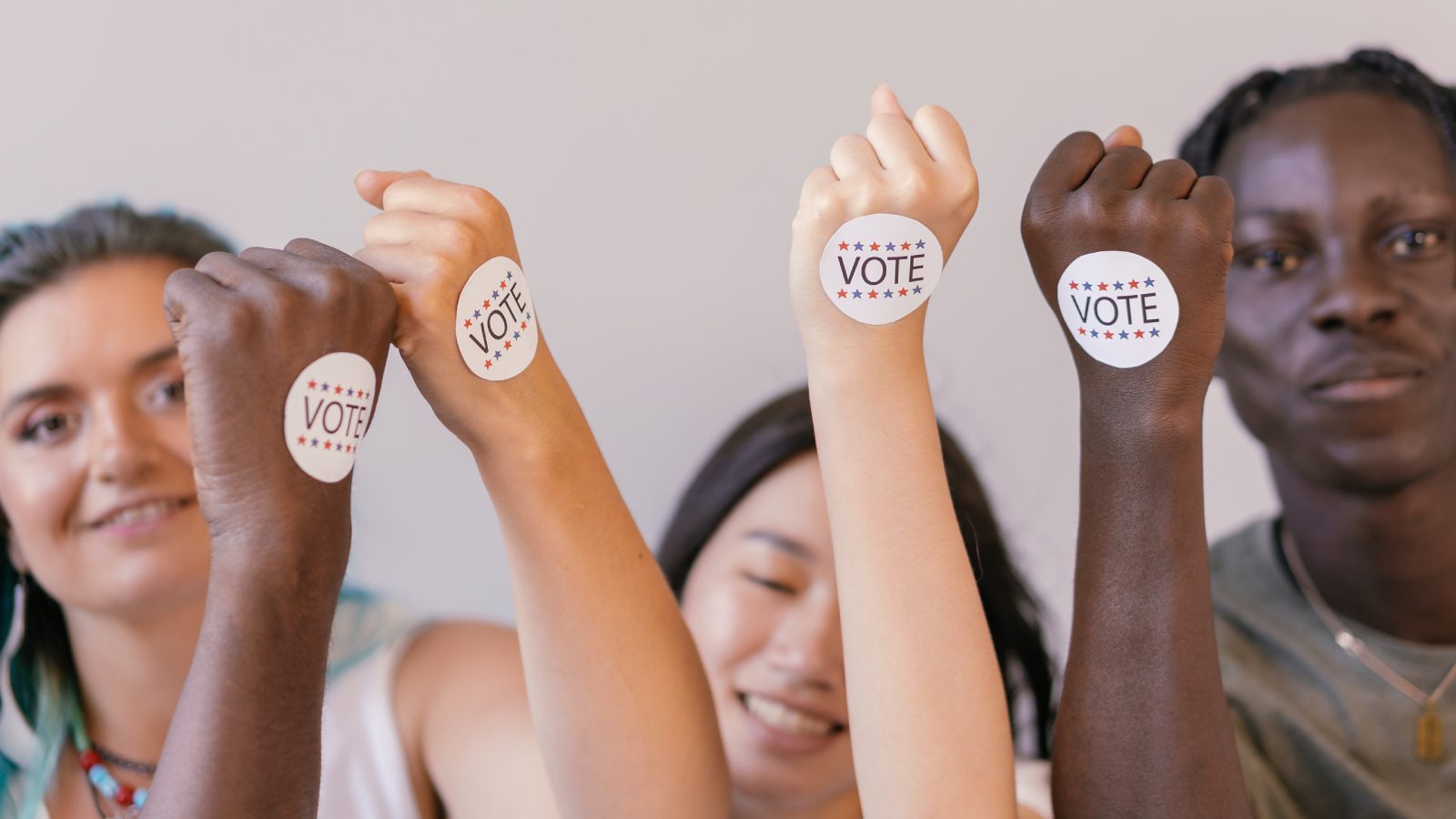Ryan Adams is co-founder of HZQ Strategies and has recently worked on campaigns to elect Jamaal Bowman to Congress, Andrew Gounardes to NY State Senate and Khaleel Anderson to NY State Assembly. On Follow the Profit podcast, Adams sits down with host David Grasso to talk about the future of progressive politics and how to run campaigns that connect authentically with voters.
David Grasso:
So on today’s episode of Follow the Profit podcast, I’m interviewing someone who I would consider a friend and who I often see around when I hang out in New York. A political operative is the best way to describe him, but also generally a renaissance guy. He’s here to talk about progressive politics, which, if you’ve been listening to the podcast, is not something we typically cover, nor am I generally interested in, quite frankly. But it’s one of those things that it’s like the cloud above our heads, we’re going to have to take notice and learn more about it. Ryan Adams. Good afternoon, Ryan.
Ryan Adams:
Thank you so much for having me, David.
DG:
So Ryan, progressive politics, you know, I see it everywhere across the country it’s becoming more mainstream, no matter what you think. And there’s a whole sort of movement occurring. Why do you think the time is now?
RA:
I think a lot of people are just getting fed up with the status quo. I mean, when we think about progressive politics, we think about, oddly enough, I think about a Republican. Because I think of Teddy Roosevelt, the original progressive from way back when, and so much of his approach to progressivism was just traveling around the country and hearing the stories of working-class people and how they were being continually downtrodden by a system that just felt broken. I think the running theme that you hear in progressive politics is that the system is broken, and we have to fix it. And then the proposal of how you fix it is very particular.
If I can use a quick anecdote, I was working on a race in a very purple district, like they voted for Trump on the presidential line, and then they voted for Democrats on the other lines, like that’s how purple it was. And one of the candidates that I was working with took a stance on police reform. And people would write to him and say, ‘I can’t believe you want to defund the police!’ He didn’t actually want to defund the police. But there was a PAC with dark money saying that he wanted to, like, release criminals into your grandma’s house and all that. And people would write these emails, and they’d say, ‘I can’t believe you want to defund the police! It’s terrible!’ And then they would say, ‘I mean, yeah, we’re spending a lot on police, and we’re not really getting safety results. And yeah, I think sometimes the police shouldn’t do the stuff that they have to do, like taking care of mental health issues because social workers would be better. And I don’t understand why we’re not spending more money on putting police in neighborhoods.’ Like when I was growing up, there were community policemen who were really involved in the community, but I don’t want to defund the police. And then if you look at all the things that the defund the police people were arguing for, it was literally all of that.
I think the left and the right have a lot of agreement on where the issues are right now. But the problem is, we are all very caught up in how to make those things happen. And I think we’re all being pulled by the apparatuses of the political system that we have currently. Because it seems like in this very purple district Republicans and Democrats wanted to stop spending so much money on wasteful stuff, but how they were talking about it was the real big difference.
DG:
And, you know, a lot of the crossover appeal, right? Let’s talk about that a little bit. What do you think the problem is in today’s world? And why do you think both candidates on the left and the right, are gaining popularity because of their anti-establishment appeal?
RA:
Because I think everybody can kind of feel right now that we’re all working harder. I mean, productivity has gone up continuously since the 70s. But the wages haven’t matched that, and it doesn’t matter if you’re a Republican or a Democrat, you’re working 40 to 60, some people working 80 hours a week just to get by, and you’re going; ‘How is it possible that I’m working more than I ever did before, and things haven’t gotten better?’
And you can partially blame that on inflation. But it’s much more tied to the connection between wages and productivity. We’re seeing money being siphoned off from every big company left and right and being put into the pockets of very few people. I mean, I think the left and the right both agree that all of the money from our work is going is not going into the right pockets, whether you think it should be going into the pockets of the government and then redistributed to people who need it or into the pockets of people and then hoping that people will step up and do the right thing. That’s a different story, but I think we’re all tired of working very, very hard and not getting the money that we need out of it.
I actually run the digital marketing and strategy agency; we have non-political clients. And I can’t tell you how often we get emails from, agencies in other countries offering to do what I do, literally emailing me saying, ‘Sir, you can white-label all of our services for a fraction of the price and then just go off on a beach somewhere?’ Like we’re in a global marketplace, and it’s very scary for us to ask, ‘Well, I want more money, I need more money, I can’t exist without more money.’ Because then all of a sudden, some guy in India is emailing them going, ‘I’ll do your social media for free. It’s not going to be great, but it’s going to be cheaper than the other guy.’ And in a world where money is hard to come by for everyday businesses and everyday people, cheap feels like a good investment. It’s not but it feels like a good investment.
DG:
So, it seems like we’re engaged in a labor race to the bottom. But there’s also a lot of migration occurring in the United States, someone like me, who leaves high tax states like New York and migrates to low tax states like Florida. Why do you think people are doing that and literally marching away from these higher tax places?
RA:
Well, that’s a tough one. Because I’m here in New York City. I love New York City. I will not be giving up on New York City anytime soon. I just moved, so I doubled down on New York City; I moved deeper into Manhattan. I think people are moving because they think they’re gonna get a better deal elsewhere. I don’t know if that’s true. I mean, I have family in Austin, Texas. And they saw huge surges in real estate. People were offering to buy my family’s house in Austin, Texas for like two times what it was worth and I was like, ‘You should sell it just sell it now; people are only going to be crazy for so long.’
But the problem is that when someone moves to a new community, they’re expecting all the same resources to be there. You could move to Austin, Texas, hoping that ‘Yeah, we’ll just work from home. And hopefully, all the business will be there. Hopefully, all the connections will be there.’ But someone has to build all those things up. My wife is in a Facebook group called “for the love of old houses,” and they post these beautiful old houses. I saw a 10 room mansion for $100,000 in Elmira, New York. And the whole pitch was like, you could take out a $300,000 home loan, have a 10-bed mansion, and it would cost you $1,600 a month and a mortgage. And I get it, but like, you’re moving there hoping to escape high taxes or whatever it is you’re are hoping to escape. We’re worried about the cost of living, but we’re not worried about the value of living.
I think a lot of people who move elsewhere are going to find that all the things that they left are not going to be there. And it’s going to be incumbent on them to build them. And you know, God bless them. If you move to a new neighborhood, you should be sponsoring the local theater. I want if you move your business out of New York, you better be like paying for every little league in that new place so that you’re a part of that community. I have no patience for carpetbaggers in any way!
DG:
Well, I understand what you’re saying, Ryan. And it’s definitely true that institutional strength in low tax states is definitely lower. Right. And you make a good point. But the problem is, it’s already happening. And in fact, I get a lot of my updates about New York politics from you, which are 1) you have a declining tax base because a lot of the city’s revenue depends on very, very high-income earners, which many are in the process of leaving, and 2) you have a city apparatus that is sort of rotten, and has a talent deficit and is inefficient and is a slow, lumbering beast, and then you have politics that are demanding evermore, which is only normal, right? We want more from our government. But at what point does the whole system not hold up in the face of all these changes?
RA:
I mean, I think you’ve really hit on something that’s important. I was saying that the tax base is leaving, but that’s because the tax code is written not around the current situation that we’re in but around where the situation was 20/30 years ago. The problem in my mind isn’t that these are high tax states; its that they’re highly inefficient states.
Like there’s a bill that’s being proposed in the New York State Senate by Andrew Gournardes. And he’s talking about taxing big data companies because every time you log on to Facebook, Facebook makes money off of you and then pays zero taxes on all the stuff that you did. You know, you are in effect, every time you post, every time you comment, creating value for them through your labor. And at no point is that ever monetized coming back to the community.
You know, we’re charging people hoping that real estate is going to save things. And we’re charging people hoping that an old economy is going to save things. But maybe we need to look back and say, every time we make a law around these kinds of things, people are just going to try and figure out a way of doing it. We need to be writing new laws, better laws. And I think a big way that we get new laws and better laws is by getting new people and better people and I think the left and the right can both agree: We need that.
DG:
You’re suggesting we’re fighting the wars of our mothers and fathers, right? We kind of think of the world as if it’s still the 1990s. And whether you’re on the left or the right, I like this idea of inefficient government, that government needs to be updated, streamlined. We constantly bicker about shrinking the size of government or growing the size of government. And I feel like we never talk about the value we get for the money that we put in.
RA:
Absolutely. I mean, I laugh because like we always talk about how the New York Post loves scaring people about homelessness in New York City. Every time you open up New York Post, it’s like, ‘The city is overrun with homeless people. If you go to Washington Square Park, they will eat you alive.’ That’s not true
DG:
I’ve read it. It’s like 1969 over there. It’s like continuous Woodstock right now.
RA:
Yeah, it’s I walked past Washington Square Park, and I was just pulled into a production of “Hair.” It was crazy. It was naked and chanting! No. They say like, ‘Oh, well, we’ve got to deal with the homelessness issue.’ Okay, it is cheaper to house people than to pay for services to keep people homeless? Why aren’t we just taking the money and putting it toward housing people? My wife is a social worker with the homeless. And you know, she says housing first is the thing that will solve everything. ‘But Ryan, what about mental health issues?’ It is easier to take your pills that will help your mental health issue if you have a place to drink water and have a schedule. ‘But Ryan, what about domestic violence?’ It is easier to escape a domestic violence situation if you have somewhere to stay. We need more housing; we need better housing. I mean, I’m a progressive, but Eric Adams has some really great housing and zoning plans for Manhattan that could really help this city. And I can’t wait to see what he does. I mean, he’s not beholden to a lot of the power structures that are already in place. So it could be a really big change here.
So, when we think about homelessness, this goes right back to people who move to Austin. Austin has a huge homelessness problem. There are people who are sleeping underneath the overpasses because the heat is so bad if they stay outside, they’ll die.
DG:
Well, homelessness is a national crisis. And unfortunately, Ryan, and I don’t say this as a partisan, bickering thing, liberals have been on the wrong side of history with zoning. And obviously, you have the tale of two cities with zoning in America, right? You have Houston that has no zoning, and they’re literally building houses and reservoirs. And then you have the city of Berkeley, California that basically invented single-family housing, zoning, and caused the national homelessness crisis. And I’m happy to hear that the new mayor of New York, the mayor-elect, Eric Adams has different ideas because it’s literally supply and demand. If you increase the supply of housing, you’re going to bring down the price. And homelessness will go down—something that California and other liberal places don’t understand, evidently.
RA:
Yeah, I mean, it’s funny, because people have been talking about how the New York real estate market was really hit hard by COVID; the New York real estate market was really hit hard by China closing off investments in the New York City real estate market. And that happened in 2017. And since then, we’ve been seeing projects slowly fall apart, but it represents a much larger issue that we have been building housing for Chinese investment accounts and Russian oligarchs and whoever is trying to squirrel their money out of their country and put it somewhere safe. Like in New York City, we’ve been building lockboxes and we have not been taxing those lockboxes. We have not been charging these people who have left places fallow that hurts the surrounding economy. And it’s just gotten to a point where we have to ask, ‘Why are we building what we’re building? Why do four different high-rise luxury towers that each have 250 apartments in them have to be across the street from each other in downtown Brooklyn, when everywhere else needs more housing that is affordable?’
DG:
And zoning and the cost of labor, Ryan? It’s pretty straightforward.
RA:
It’s funny, if you go into really progressive circles, they’ll start chalking up labels, and they’ll say, ‘The progressives didn’t destroy housing; liberals destroyed housing.’ Because liberals wanted to create a little microcosm of the American Dream where everyone gets their own house. And because of that, they became the “not in my backyard” NIMBYs who pushed people out when they needed to build more housing. A lot of folks will say they want everyone to have an opportunity in life; they just don’t want it near their opportunity.
DG:
I think this is one of the biggest issues of our time, Ryan. If you want to follow the profit, the problem with our current housing crisis, which is now national, used to just be in our big cities, but now it’s everywhere. The net effect of all these zoning laws and restrictions is just a disaster: surging levels of homelessness, lower levels of homeownership, and it’s just a complete evisceration of the American dream. And now you see people writing op-eds in places like Bloomberg and Yahoo that say, ‘Oh, a renter society is a dream for America.’ And I don’t think it’s a dream. I think it’s a nightmare.
RA:
I mean, some people want to rent. Just earlier today, I was just reading about why everything is pushing towards renting. And it’s partially because the debt cycle has gotten out of control. Ray Dalio, I think one of the smartest people out there has this whole theory about short-term and long-term debt cycles. And the short term is why we have a crash every 10 years around some sort of bubble, whether it’s tech, whether it’s real estate, whether it’s, I mean, cryptocurrency is not big enough, quite yet to be a bubble. But certainly, you’re getting the sense of that. And then we have these long-term debt cycles, where the whole political and social economy kind of gets flipped on its head. Because if you spend 40 years building up the value of housing, and you spend 40 years convincing multiple generations that housing will never go down, it will always be the best investment. And people take that totally uncritically. Eventually, those chickens have to come home to roost, you know; every debt is someone else’s income, and you have to pay those things. So we can’t keep printing the money that we do, and not expect that at some point, it’s going to be paid back; it’s going to have to be dealt with. And even with modern monetary theory, there has to be some sort of rationality and semblance of order in the system. And I think a lot of young people, you know, people under 40, are looking at the system and the world that they grew up in, and they’re going, ‘None of this makes any sense.’
So on the bright side, we are at the end of a long-term debt cycle. It’s a brave new world. I have a master’s in religion, and it’s an apocalypse in the sense that a lot of revelations will come, and a new beginning will come out of it.
DG:
Revelation to Genesis, I guess that’s the cycle, right? So, Ryan, you sound like a fiscal conservative. It seems like in Washington these days, we’re all modern monetary theorists, where the deficit doesn’t matter, debt doesn’t matter, let’s give everyone what they want. We basically have a Republican tax regime and universal basic income at the same time; half of our money that is flowing through the system is borrowed at the federal level, and consumers are drowning in debt. Ray Dalio is right; we are at the end game in terms of debt. How long can this system go on?
RA:
So I do want to say I’m not a fiscal conservative because the thing that I disagree with is the Republican tax regime; I think you have to tax people with money. The problem is that most people don’t have the money. I’m very in favor of the modern monetary policy if it’s going from the government directly to people, and we’re seeing that with the child tax credit. I mean, I can’t tell you how many lives I know in New York City were saved by the fiscal stimulus checks that hit. I saw group chats of people Venmo with each other, just to help them get to that point where the stimulus got there and people were really, it was a very dark time. So I think you got to pay for that by taxing people who are flying into space currently.
DG:
A not-so-subtle reference to Richard Branson, Jeff Bezos, and Elon Musk.
RA:
It’s never a good sign when the richest people on earth are like, you know what I should do? Leave immediately. It’s very scary. When the world is on fire, they’re like, I’m just gonna go to another planet.
I mean, I’m not Nostradamus. I’m not going to predict any, you know particular timelines. I’m going to go back to Ray Dalio, everyone should go read “Principles of Debt.” Principles is one of the best books I’ve ever read; I read it once or twice a year, just because it’s like a fantastic management book. But he’s on LinkedIn once every week just, you know, typing away all of his thoughts. And he’s got a bunch of great YouTube videos that explain all of this. And one of the things that he really likes to stress is that at the end of a long-term debt cycle, the polarization between the haves and the have nots gets very, very, very intense. And other countries will see the weakness in a polarized government. He loves talking about how empires rise and fall and whether they fall apart gracefully, and kind of give way to a new world order. Or they are, you know, ripped apart by their own internal forces.
And so what we’re looking at, you know, I’d say over the next 10 years is a global world order that’s really changing. You have, you know, pre-COVID, China was already building the infrastructure to become the ascending power, their Belt and Road Initiative was a masterstroke in global economics and whatnot. But then COVID, low-interest loans, projects that require resources and labor in the middle of a global pandemic become a very, very tight, very, very hard investment to make. I mean, we’re seeing everything that happened with Russia and think that Russia is not a player in all the different cybersecurity initiatives we have to be worried about. The whole world is kind of looking at America right now going, ‘It is not as strong as it used to be. I can be a power; we can be a power.’ And knowing that I think it’s incumbent on us to not rest on our laurels. Because in the next 10 years, we could see skirmishes in the South China Sea, we could see infrastructure attacks by global actors, we don’t know what the world could look like. And to assume that the last 30 years is a good predictor of the next 10 is a good way to be caught off guard the same way.
DG:
Assuming the last three years was a good predictor of what 2020 would have been about Ryan, a lot of that has to do with, from the outside looking in, the division is so bad in this country. It’s highly unusual for someone like me to have someone like you on the same podcast, without screaming at each other. So how do we, you know, keep it together here to prevent us from, just crumbling and giving an opportunity to bad agents like China?
RA:
I think it’s a really good question because I’m a little worried that someone’s going to like tar and feather me for just saying it. But you know, so be it. Anyone who wants to kind of rip me apart for coming on a podcast to talk about how we need to work together is probably not someone who’s going to work together with me in the first place. And I say that for the left and the right. I think when I talk in progressive circles about political organizing, there’s a lot of folks who come at this and they think, ‘I don’t ever want to work with a Republican because they are never going to act in good faith with me.’ And I feel the same. I wish I could say the same for Republicans coming toward Democrats. But I feel like a lot of Democrats in Congress will always fall for the trick that Republicans will be like, ‘If you just give me an inch, I promise I won’t take a mile.’
I mean, I’m not I’m not going to name congressional names, but there’s got to be a couple of them with really sore backs from trying to kick that football and falling. I think the problem here is that it doesn’t feel like we can trust the other side to actually make good on their promises. And, you know, I was not a fan of Donald Trump, one could say, very strongly. And I think he eroded that in so many ways. I mean, his approach to government was anyone who gives up an inch is a sucker, and they deserve to be exploited. And the moment that becomes the political tenor of the Republican Party, you’re going to get Democrats saying, ‘Why bother?’
What we saw with all of the reconciliation and Congress of like, we’re not gonna sign anything until we get exactly what we want. You had organizers everywhere across the country going please, for the love of God, do not fall for this. He is going to ask for concessions, you are going to give concessions, and then he is not going to whip the votes, and you are going to be left in a weaker bargaining position. And you know, well, we got to try, and then you try, and guess what? It doesn’t happen. And now we’re going to head toward real reconciliation with the stuff that we need.
DG:
But I hear the exact same thing about people on the right with how they feel about people on the left. You know, listen, I don’t have a dog in this fight. I’m a registered independent, like, I don’t care to correct you. I tend to think that interviews are meant to channel the energy of the guests, not fight with them. But you know, it’s one of those things; I hear the exact same argument from the right. So to me, and this is just speaking as someone who just wants to see a better country and a more unified people and really to set our differences aside, it’s really easy to blame each other. But in the end, it’s us who suffer. We all suffer.
RA:
I think you’ve hit on a very good point. And I’m gonna validate that and then tell you a little secret. I think you’re right, that the only way that we come to this together is that we stop playing in the media wars. And we start turning down the rhetoric. Like when Mitch McConnell said, ‘I am the Grim Reaper of bills in the Senate,’ there’s no working with a person like that. Whether you say it privately or publicly, that stuff gets out. And that really brings me to the thing that I’ve seen, I’ve been working in politics for a good chunk of time now. And the thing that I think most people don’t realize, and I tell this to everyone I talked to, politicians are afraid of the people that they serve. Not in the like, ‘Oh, god, they’re gonna come for me’ kind of way. But like, you have so much more power than you imagine as a constituent. I’m the guy who checks the email account when you email info@politician.org or whatever. And every one of those emails gets forwarded to a campaign manager, a candidate. I have seen what happens when as an office, the moment you get five calls, someone goes, ‘We have to have a meeting about this; how did this happen?’ So anytime you think, God, I hate the way this politician who represents me is acting, you need to call them, you need to email them, you need to post about them.
DG:
I know this, Ryan, I worked in constituent affairs for a Republican politician at the state level in Florida. And oh, my gosh, if you got two or three emails on the same topic, it was like, wait, wait, wait, stop the presses. And people don’t understand that there are so many different levels of government, even your state rep or your state senator, wherever you live in America, you have a voice. And it’s not just about national politics.
RA:
And it’s not related to how much you donate. It’s so funny because people think that money in politics is what wins. But if you were paying attention to the New York City mayoral race, there were people who spent millions of dollars and came in abysmal in the rankings and whatnot. And they think that I’ve literally seen states, like state elected officials say, ‘Listen, lobbyists can give me whatever money they want, and I will happily take a meeting with them. And then I can happily ignore everything.’ But I have never seen a state rep that I’ve worked with, or a congressional rep or anyone for that matter, say, ‘Oh, yeah, just ignore that person. They called and they were upset.’ No, the moment they call, they get an email back. The only time I’ve never seen someone respond is when there was some sort of email issue. You know, like, they didn’t get the email, they didn’t get the call. They didn’t get the text. But I think, going back to that the last, you know, the sins of the past becoming the problems of today. I think there was a very strong sense, was it Fukuyama who said the end of history, like the neoliberal order has kind of settled history. We don’t need to fight for things anymore. Everything is pretty good. Everything is pretty stable. And any aberrations from that are just little changes to the sacred timeline. You know, they’re not there, they just can, they can be pruned and be dealt with.
DG:
Tell me about running your campaign. What really happens behind the scenes? Because we’re also political now, and no matter where you’re from the left or the right, like, there’s all this sausage that’s being made behind the curtain. You mentioned that we all have a voice, and you actually listened to people, and money doesn’t matter as much as you think. What else is an important note that we should take note of?
RA:
Good campaigns are run by people who know and love their community. So like I said, I have a master’s in religion, I almost became a rabbi. I was speaking to a rabbi about this. And the rabbi said to me to be a rabbi is to have a profound love of Jews and only a moderate love of Judaism. Politics is the same way. Every call you get, you have to love every interaction you have. If you were running as a politician to be a real policy wonk who spends their days writing laws and whatnot, you will be a great legislative director and a terrible politician who will not win. Because I mean, 85% of every good political campaign is talking to voters. And that’s, you know, if I was running for something, it would be me talking to voters, and then it would be me recruiting 25 people, five in every part of the district, talking to voters, and then recruiting people in languages that I do not speak to talk to voters and record robocalls and send out texting. The idea here, and I have studies on this, is if you look through the elections that people have been winning lately, if you do not talk to voters, you will not win. You absolutely need to talk to voters. And when you talk to them, you need to talk to them, honestly and earnestly. Do not pay random people to knock on doors and go ‘Hi, my name is Todd. I’m from Ryan Adams. Have you made your decision to vote?’ ‘No, I haven’t Todd, please go home. I’ve never heard of this guy. I have 1400 pieces of mail from him. I have a folder right here of literally all the mail from races that I never read because I got so many of them in New York City.’ You know, people want to raise money so they can do big sexy TV ads, but big sexy TV ads do not win races. Big, sexy mailpieces do not win races. You win races when you care. That is the long and short of it.
DG:
That goes against everything we hear and big money donors who are ripping up the airwaves. They’re spending money on television commercials, they’re putting out mailers, it seems like it’s very much a money game. But that’s not what you’re suggesting.
RA:
Well, it is a money game, if you do not see that. The thing about lies is that lies only fill a void when there’s a void to be filled. If you have not spoken to voters, and someone says, ‘I heard that so and so you know, kicks puppies.’ If they know nothing about you, the first thing that they heard was I hear so and so kicks puppies. And they’ll go you know, he never knocked on my door.
That race that I was talking about where billionaire had spent a million dollars on TV ads to say that this guy hated the police, we did a whole study of this, and we found that the ads didn’t work. People remembered them. People remembered his ads more than they remembered our ads about the candidate. But they didn’t vote on them because everyone was going, ‘Oh, that guy doesn’t hate the police. He was endorsed by the Benevolent Association of New York State. He doesn’t hate the police. He passed the 911 responders bill.’ Like you can scream whatever you want about your opponent. But if it doesn’t feel true, because you’ve already had honest interactions with them, it doesn’t work.
Politics became very lazy politics in the 90s. In the early 2000s became this crazy —I’ve met those consultants who were big then. And so many of them are like you put out the mail, you do the TV ad, you do the robocall, you could do these Facebook ads, but I don’t care. You know, they don’t kiss babies because babies don’t vote, but they will help us send you to a senior center because they think the only people that vote are seniors. And that’s why they’ll spend 25% of your budget on mail. And that’s just not true. People who vote are people you engage. There’s this funny thing where a lot of old school consultants will say well, that group of people doesn’t vote.
DG:
They ignore us. They’re like, ‘Oh, you’re under 40, you’re never gonna vote.’ Oh, yeah.
RA:
Or they’ll do it with ethnic groups will be like, ‘Asian Americans don’t vote.’ And if someone said that to me, it’s like, well, one Asian American in New York City could be Korean, could be Malaysian, could be Chinese, could be Japanese. That’s like there’s a thing that Spanish-speaking people don’t vote. Okay, cool. Who are you talking about? That’s a big umbrella term. That’s lazy nonsense. And they do that because they don’t want to be engaged.
I would tell anyone doing anything right now, whether you’re starting a business, whether you’re running a political campaign, Whether you’re starting a nonprofit because we need those too, you have to care more than you’ve ever cared before. And when you do, it will shine through because everyone else, all the big established people that you’re fighting, they have gotten lazy. They have gotten lazy. And the only reason they suddenly care is that you have scared them now. I worked on Jamal Bowman’s congressional race. And I remember the beginning of that race, people were like, no one is going to beat Eliot Engel, the man is an institution. And then the more we did, the more they cared. And it wasn’t. What did Elliott Engel say on that hot mic? ‘I wouldn’t be here if there wasn’t an election.’ Wow, I remember that. Yeah, and I just went, that’s it. That is the confirmation of everything people believe is wrong with politics in one statement, and he deserves to lose. And he did.
So if you’re running on the left or the right, I beg you to run with policies that center people. And and, you know, I’m going to do one more religious thing. There’s a prayer in Judaism, you’re supposed to say it every day. And it says that you should, you should love God with all your heart and all your soul and all your mind. And that is how you need to approach everything with all your heart and all your soul and all your mind. Then you can follow whatever prophets with it that you want, and I guarantee you will go very far.
DG:
So tell me a little bit since it’s since you are quasi Rabbi and in politics, I’m sure Israel’s on your radar. In Israel, something that we’ve all seen coming to the news a lot, you know, it seems like American Jews are peeling off in their support for Israel. And you elected someone who has famously spoken in favor of the Palestinian cause, Jamal Bowman, do you regret having removed someone who was very pro-Israel and replacing them with someone who is not so “committed?”
RA:
Well, I don’t think Jamal Bowman is anti-Israel. I think he’s pro-peace. And I think pro-peace requires pro dialogue. And, you know, I’m no expert on Israel. Love it, the honeymoons. They’re really fantastic.
DG:
But wait, the rabbi honeymooned in Israel, how unusual.
RA:
That’s funny because it’s all tied to what you just said. I was on a program called Honeymoon Israel that’s meant to engage non-traditional Jewish couples. My wife is Catholic. I’m Jewish, with Jewish life, Jewish community and Israel. And the reason the program exists is that for so long, the assumption was like, if you are a Jew, you will go to college, you will be in Hillel, you will then go on birthright and then you will love Israel forever. And you will stop asking any questions about it. And you know, that worked for a good chunk of time. But as things develop, people begin to question more things, and great programs like Honeymoon Israel are trying to engage people in a way that makes them go, ‘Wow, I spoke to Israelis, we went to the Lebanon border, we saw the walls and the holes from rockets. We spoke with Palestinians.’ You know I’m no Israel expert, but I will say the best way to learn about the Israel Palestine conflict is to talk to Israelis and Palestinians and hear from them about what their experiences are and what’s going on. I mean, even Israel is going through its own political revolution. You know, getting rid of Bibi is like a big, big deal. I’m trying to think of the right word that doesn’t have a negative connotation, but like it’s life-changing.
DG:
Is there room for Israel support among progressives? Because it seems like a lot of people are concerned that progressives are just anti-Israel.
RA:
I think there’s room for it. If progressives want to make room. I’ve been in some spaces where I’ve had to call out progressives for saying things. I’ve experienced antisemitism a lot in my life. I’ve been beaten up. I’ve been made fun of. I used to wear a yarmulke at one point in my life, and someone took it and played frisbee with it, like I have experienced the antisemitism pretty, pretty intensely. And I’ve been in rooms with progressives who go, Oh, well, that person, he’s got the support of like, these big Jewish donors, you know, because of Israel stuff, and then it slowly transitions into ‘Well, you know, how those people stay together?’ And then it suddenly is like, ‘Well, you know, the Jews will …’ and the moment you say, ‘the Jews,’ you’re in a really bad place, because just like saying, the Asian Americans or the Spanish speaking vote; there are lots of different kinds of Jews. There are lots of different kinds of people and they all have very different opinions on things. So I think if the left wants to make room for I mean, Zionist is a very hard word because it has a lot of connotations with it. But like pro-Israel people, they can do it. There’s definitely room for it. I mean, you can’t, you can’t have peace without partners.
DG:
You’re so careful in the way you express yourself through this medium. I know you, have you been hanging out with liberals too long? So how do we improve our economic system while staying competitive in a superpower? Because I feel like a lot of progressive demands are, you know, well-intentioned, and in a perfect world, we give everyone everything, but we live in a world of finite resources. And you said it best, you know, debt is a major problem. limitations are major problems. So how do we do this?
RA:
You’re gonna hate this, and you can play Russian music behind it. But we need to share in the wealth a bit more. You know, someone said that we have a labor shortage. And it’s not a labor shortage. It’s a wage shortage. People know that they’re in demand. That’s what happens after every pandemic. We have to pay people more, we have to change the way that we treat people. And when it comes to government programs, we have to center people first. I think we’re experiencing a very different economy that’s been dressed up to look very lively. But once the eviction moratoriums, and once, once the student loan moratorium, oh, my God, Joe, Joe Biden, if you’re listening, you better start fulfilling some of those promises you made, because a lot of people get mad about the demands.
But if you think about it this way, like my wife is a social worker. Together we have I think it’s like $1,000, or something in student loans per month. Wouldn’t you rather I spend $1,000 on American businesses? Wouldn’t you rather maybe give that money to restaurants and tipping real people who will then go and spend it on real things? Jeff Bezos doesn’t need more money. I assure you, he is good. He lost half of it, and he’s still going off to space. Maybe the job creators of the past were really truly job creators, but now they’re becoming robber barons as they did in the 1890s in the early 1900s. And we need progressivism more than ever because of that. And so we need to be centering people. The percentage of the stimulus checks that went out were almost automatically recirculated back into the economy and then taxed. That is the kind of stuff we need.
DG:
I guess where I peel off Ryan is all of this as well-intended. But if you forgive student loans, you have to reform higher education. And if you help people, you have to address the root causes of what’s causing these issues. So to me, student debt, and poverty and lack of health care coverage are more symptoms of the problem rather than the problem. And I feel like neither side really gets at that. What is the dysfunction in our economic and political and cultural world that is causing this dysfunction?
RA:
I think you’ve actually really nailed that differentiation between the left and the right. It’s that, in order for us to fix things, we can’t just deal with the symptoms, which is the left loves dealing with symptoms, because symptoms are painful, and the left loves dealing immediately with pain. Oh, you’re homeless, here. Let me get you out of homelessness, but doesn’t fix the homelessness crisis. The right loves dealing with problems. But you know, that takes time. And sometimes that causes more harm over time because of it.
My wife, who again, who is a social worker, often talks about how if you’re going to help someone get out of homelessness, you have to deal with the symptoms and the problem. You can’t just give someone lithium if they’re bipolar, and then be like, great, you should be out of your homelessness situation in the next week. That’s not how it works. You need to fix the symptom. And the problem. And I think one of the things that is really taxing on America right now is that both were chained to idols of the past. And I think what’s so important about podcasts like this, and the work that lots of people out there are doing is that they’re trying to get new ideas and new people in, who are not beholden to how these things work. And I think that’s the way we’re really going to change stuff. We need to listen, forgive student loans and then change the student loan program so that you know there aren’t dinky little colleges that have 500 people at them that are not preparing anyone adequately or just, for lack of a better word, scams. If we’re going to fix the housing crisis, let’s fix the housing crisis. I think that America would be better off if we were all fully invested. And I think that’s the thing that we all really need to come by.
One of the things that has really bugged me is that the media, you know, during the pandemic, there was an incredible opportunity for the media to come together and present a unified vision of what it means to be American. That didn’t happen, right. And it kills me because every day I’d wake up, I’d make coffee, I’d open the news. And I hear the stories of misery and pain. And then I’d go to work. And I would hear stories about these incredible people there was there was an organizer who was also a candidate running last year. And she organized the Hillel carts in Queens to feed people because they couldn’t work. She raised money privately. And then she paid them to make meals for Ramadan because people were hungry. And the city was coming up short because of all sorts of issues. And no one ever told her story. No one ever told the story of the state senator who basically pulled a Shirley Chisholm and got a whole bunch of farmers markets to deliver their food, not to the farmer’s markets, that they were all closed, but to food pantries instead and paid them for it. There was so much innovation, so many beautiful things happening, that showed that we will get through this if we work through it together.
So if we’re going to talk about, you know, America moving forward, it has to be one where we’re all invested in this project together. Not everyone is out here just trying to get their own. I think if we’re going to move forward, we have to say, what’s working, what’s not? And how can we pull everyone along the way to make sure that there’s an inclusive vision of the world that everyone has a place in. And if you want to win, you got to call people, you got to talk to people, and you have to have a vision of the world where people can see themselves in it.
DG:
And you have to have new ideas, and a lot of our wars are generational wars that are no longer relevant in today’s world. And I think you know, I don’t have a lot in common with your politics, Ryan. But I think you are committed and you care. And I think that that is three-quarters of the battle really, is people who understand the issues as they are today, not as they were 25 years ago, which we seem to be rehashing all these things as if it’s still the 90s.
RA:
If it was still the 90s, and the solution still works, I could still go to a movie for like six bucks. And the movie theater down the street from me, I think it’s 15.
DG:
And then nobody’s going there, because it’s going into straight into our houses. And the whole model of how we used to live is falling apart. And politics, whether it’s left or right should probably reflect these new realities, shouldn’t they?
RA:
It should reflect the people. And the city council in New York City for the first time in years, is going to reflect the real diversity of the city, you know, in terms of gender, in terms of ethnicity, in terms of sexual orientation. And that, I mean, thank God for it; it gives me hope. New York City, as much as people love to think of it as a very liberal city, is entrenched in economic interests that work very hard to keep things a particular way. And if New York City can overcome a lot of those interests, I know the rest of the country can too. It just takes very dedicated, very passionate people waking up every day and saying this is worth it.
DG:
Well, you know, as good as the rest of the country. So even if you are a Republican listening somewhere from Kansas, that’s our flagship city. So we wish all of you in New York the best in all of your endeavors. And as they say, often around here in Florida, where I’m doing this recording, maybe don’t bring all those politics here. But bring that ferocity and attacking those special interests, and all of those things that don’t make any sense in today’s world.
RA:
It sounds nice. It sounds like a plan. Please also come to New York; we’re reopening, we thrive on tourism. It’s Restaurant Week. Get tested, make sure you’re negative, get vaccinated, and then and then come on down. Broadway’s reopening in the fall. It’s going to be beautiful. Please go.
DG:
I’m excited to come. On that note, thank you so much for your time. We really appreciate it.
RA:
Oh, it’s my pleasure. Anytime.
If you haven’t already, please find Follow the Profit on Apple, Spotify or iHeartRadio so you can hear it every week. Subscribe to our YouTube for exclusive content. And please leave us a rating or review. Thanks for listening.


























